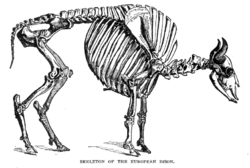Wisent
The wisent (or the European bison, Bison bonasus) is a bison species and the heaviest surviving animal in Europe. It is a close relative of the American bison.
| Wisent | |
|---|---|

| |
| Scientific classification | |
| Kingdom: | |
| Phylum: | |
| Class: | |
| Order: | |
| Family: | |
| Genus: | |
| Binomial name | |
| Bison bonasus (Linnaeus, 1758)
| |
Longer legged and less heavily built than its American cousin, the wisent may reach a height of 54 to 60 in. (137–152 cm) at the shoulder, and a weight of more than 1 ton (900 kg). It has brown hair and short upcurved horns. Its hump is less prominent than that of the American bison and its coat less shaggy.
Reproduction
In the wild the wisent is a forest animal; it browses on leaves, ferns, and bark. Females give birth after a gestation period of 9 to 10 months, usually to a single calf. Abundant in Europe in prehistoric times, wisents remained numerous until the early Christian era.
Extinction
The Wisent has been hunted for their meat and removed from their habitats by farmers. Thus by the 11th century only a few hundred were left alive. By 1927 less than 50 remained. Since the formation of an international protective society in 1932, their numbers have been growing, but they are no longer found outside zoos or reserves.
Wisent Media
Bison depicted at cave of Altamira
A specimen of the now-extinct Caucasian subspecies, 1889
Bison usually live in small herds of about 10 animals; the image shows a herd in a nursery in the Altai Mountains.








